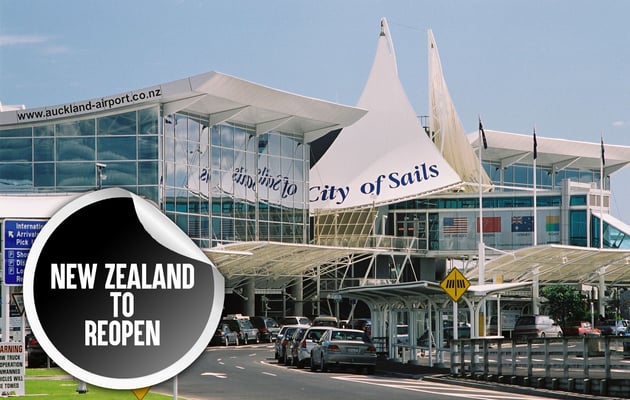New Zealand businesses cautiously welcome border reopening

Last week the New Zealand government finally made the much-awaited announcement about the reopening of its borders in phased manners.
There were a variety of reactions to the announcement from various industries. Specifically, exporters, businesses in travel and tourism industry who welcomed the announcement while expressing some concerns.
On the political side, the National Party welcomed the decision, “It’s also good news for businesses and workplaces that rely on NZ being open to the world so that they can get the critical workers they need into the country,” National leader Christopher Luxon said.
Business community reacts
Exporters and business community across NZ expressed their relief over the phased border reopening. Employers & Manufacturers Association (EMA) chief Brett O’Riley said removal of cumbersome and outdated MIQ system will come as a big relief as exporters will now be able to meet their clients face-to-face, build relationships, gain from travelling, swapping ideas and trends.
O’Riley also expressed his concern over the ongoing skills shortages across many NZ business sectors, asking for a faster immigration reset to meet the skill shortage gaps.
The India New Zealand Business Council (INZBC) which facilitates India-New Zealand trade also welcomed the announcement.
INZBC Chair, Earl Rattray said “The border closure has been one of the biggest obstacles for many NZ businesses who have invested overseas, making it difficult to operate remotely. The announcement which came after almost two years of border closure will give those who need to travel a lot more confidence to plan ahead.”
INZBC also shared data from research conducted by Export NZ, where more than 319 NZ exporters, cited increased costs along with unpredictable transport options and the inability to travel due to the Covid-19 / Border MIQ restrictions as major barriers to exporting.
Canterbury Employers’ Chamber of Commerce pronounced border reopening as a great news for Canterbury businesses which have been suffering from shortage of workers.
Leeann Watson, Chief Executive of Canterbury Employers’ Chamber of Commerce, said, “Reconnecting with the rest of the world and addressing the constrained labour market by attracting new skills to New Zealand is the first step in our economic recovery as Covid-19 becomes a normal part of our day-to-day lives.
“Other countries have welcomed immigration as part of their economic recovery plans, and we need to move quickly to ensure New Zealand can be globally competitive.”
Need for an Immigration Reset
Leeann Watson, Chief Executive of Canterbury Employers’ Chamber of Commerce also mentioned the immigration reset, “The Government has indicated there are significant changes to immigration coming and we want to see an emphasis on supporting employers. Rapidly increasing the speed of processing visa applications particularly through the new Accredited Employer Work Visa scheme is crucially important. The process needs to be quick, simple and straightforward.
“It is positive to see that skilled workers will be able to enter New Zealand in March, however the requirement of 1.5 percent median wage is adding unnecessary wage pressure to business. Skilled workers should be allowed in based on their skill, and nothing else.”
Immigration lawyer Aaron Martin in his comments was more critical saying the government has underestimated the damage that has been done to this country’s reputation through our Covid-19 management.
“Given our recent history of essentially abandoning working tourists and leaving them with no income and no support, it’s going to take a lot of courage for people to decide to come to New Zealand and risk that happening again,” he said.
“Right now, it seems we have a dual approach which is out of step with the rest of the world. Other countries are learning to live with Omicron by opening the borders, relaxing restrictive conditions, and minimising self-isolating time. Yet visa holders entering NZ are still subject to restrictive Covid-related conditions including the potential for weeks of self-isolation with no income.”
“What we need is a relaxation around the ability to get workers into New Zealand. It's what's needed for the development of business and to boost economic activity, and it’s what businesses want.” Martin said.

Last week the New Zealand government finally made the much-awaited announcement about the reopening of its borders in phased manners.
There were a variety of reactions to the announcement from various industries. Specifically, exporters, businesses in travel and tourism industry who welcomed the...
Last week the New Zealand government finally made the much-awaited announcement about the reopening of its borders in phased manners.
There were a variety of reactions to the announcement from various industries. Specifically, exporters, businesses in travel and tourism industry who welcomed the announcement while expressing some concerns.
On the political side, the National Party welcomed the decision, “It’s also good news for businesses and workplaces that rely on NZ being open to the world so that they can get the critical workers they need into the country,” National leader Christopher Luxon said.
Business community reacts
Exporters and business community across NZ expressed their relief over the phased border reopening. Employers & Manufacturers Association (EMA) chief Brett O’Riley said removal of cumbersome and outdated MIQ system will come as a big relief as exporters will now be able to meet their clients face-to-face, build relationships, gain from travelling, swapping ideas and trends.
O’Riley also expressed his concern over the ongoing skills shortages across many NZ business sectors, asking for a faster immigration reset to meet the skill shortage gaps.
The India New Zealand Business Council (INZBC) which facilitates India-New Zealand trade also welcomed the announcement.
INZBC Chair, Earl Rattray said “The border closure has been one of the biggest obstacles for many NZ businesses who have invested overseas, making it difficult to operate remotely. The announcement which came after almost two years of border closure will give those who need to travel a lot more confidence to plan ahead.”
INZBC also shared data from research conducted by Export NZ, where more than 319 NZ exporters, cited increased costs along with unpredictable transport options and the inability to travel due to the Covid-19 / Border MIQ restrictions as major barriers to exporting.
Canterbury Employers’ Chamber of Commerce pronounced border reopening as a great news for Canterbury businesses which have been suffering from shortage of workers.
Leeann Watson, Chief Executive of Canterbury Employers’ Chamber of Commerce, said, “Reconnecting with the rest of the world and addressing the constrained labour market by attracting new skills to New Zealand is the first step in our economic recovery as Covid-19 becomes a normal part of our day-to-day lives.
“Other countries have welcomed immigration as part of their economic recovery plans, and we need to move quickly to ensure New Zealand can be globally competitive.”
Need for an Immigration Reset
Leeann Watson, Chief Executive of Canterbury Employers’ Chamber of Commerce also mentioned the immigration reset, “The Government has indicated there are significant changes to immigration coming and we want to see an emphasis on supporting employers. Rapidly increasing the speed of processing visa applications particularly through the new Accredited Employer Work Visa scheme is crucially important. The process needs to be quick, simple and straightforward.
“It is positive to see that skilled workers will be able to enter New Zealand in March, however the requirement of 1.5 percent median wage is adding unnecessary wage pressure to business. Skilled workers should be allowed in based on their skill, and nothing else.”
Immigration lawyer Aaron Martin in his comments was more critical saying the government has underestimated the damage that has been done to this country’s reputation through our Covid-19 management.
“Given our recent history of essentially abandoning working tourists and leaving them with no income and no support, it’s going to take a lot of courage for people to decide to come to New Zealand and risk that happening again,” he said.
“Right now, it seems we have a dual approach which is out of step with the rest of the world. Other countries are learning to live with Omicron by opening the borders, relaxing restrictive conditions, and minimising self-isolating time. Yet visa holders entering NZ are still subject to restrictive Covid-related conditions including the potential for weeks of self-isolation with no income.”
“What we need is a relaxation around the ability to get workers into New Zealand. It's what's needed for the development of business and to boost economic activity, and it’s what businesses want.” Martin said.









Leave a Comment